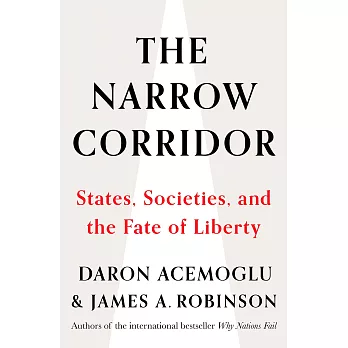自由不是一份張開雙手就能獲得的天賦之禮,
它存在於一條狹窄的長廊,建立國家與社會的力量彼此牽制相衡
我們深信自由享於世上每一個人類,無論表達、行動、選擇;自由意謂著我們不受其他人與力量的宰制,更無須時時生活於脅迫及恐懼的暗影之下。然而,綜觀人類數千年歷史,自由根本稱不上是與生俱來的天賦人權。勢微者難以和強權者抗衡,充滿衝突戰爭,受著種種文化陳俗的限制壓迫。
當人們尋找和平安定,逐步建立共識打造出國家,讓它調停紛爭,並實現個人一己之力所不能完成的建設、服務與制度。卻發現,國家是個善變而不穩定的制度,弱小的國家可能被其他強國侵略,無力保護人民,讓日子墜回內亂動盪;強國,則可能走向獨裁並偏好權勢團體,侵害與無視人民的意志及福祉,使人們依然生活在壓迫之中。無論在哪一種狀態,自由都依然只是夢想。
兩位作者透過回溯過往的歷史,得出這條命題:自由,從不是從一條康莊大道翩來到,從此穩固安適,而是在國家與社會,兩者綿長而永不停歇的彼此拉鋸、牽制中而生。唯有在兩股力量之間尋得珍貴而脆弱的平衡,這條如履薄冰的窄道,就是自由所居之處。
破除西方樂觀的迷思──相信孕育於啟蒙時代,而今我們已建立完善的制度維繫國家與社會的力量平衡,為自由找到穩定的道路──作者認為這種說法過於不切實際。隨著世界不斷變遷進步,人民需求亦將不斷改變,要求國家提供更好的體制、權力與更自由平等的生活;同樣,國家也因變化,要求人們提供更多資源與賦權,面對挑戰。在這兩相抗衡,雙方都會試圖茁壯,以持續在生存的窄道中佔一席之地,自由的脆弱,及它永遠處在進行式的本質,從中不辯自明。
檢視歷史上不同國家的制度建立和演變,為我們描繪出自由如何建立在國家與社會、經濟與政治、菁英與市民、部門與準則等各種關係的脆弱平衡中,其中不可少的關鍵要素,解析為何有些國家能持續在自由的狹廊中前行,又為何有些國家稍有不慎,便脫離其存在的窄道。
《國家為什麼會失敗Why Nations Fail》讓我們理解,國之貧窮與苦難來自國家機器對菁英階層的偏袒,喪失其為廣大眾人服務的核心價值。《The Narrow Corridor》帶我們更深入探索自由與國家、社會大眾的彼此競合。當如今自由之路日趨艱險難行,作者充滿關懷的文字,細緻的分析,幫助我們找回國家存在的意義,更提醒我們,自由如此美好又脆弱,每一個人都擁有責任與行動力影響國家,漫步在自由的道路之上。(文/博客來編譯)
From the authors of the international bestseller Why Nations Fail, a crucial new big-picture framework that answers the question of how liberty flourishes in some states but falls to authoritarianism or anarchy in others--and explains how it can continue to thrive despite new threats.
Liberty is hardly the "natural" order of things. In most places and at most times, the strong have dominated the weak and human freedom has been quashed by force or by customs and norms. Either states have been too weak to protect individuals from these threats or states have been too strong for people to protect themselves from despotism. Liberty emerges only when a delicate and precarious balance is struck between state and society.
There is a happy Western myth that political liberty is a durable construct, a steady state, arrived at by a process of "enlightenment." This static view is a fantasy, the authors argue; rather, the space to attain and maintain liberty stays open only via a fundamental and incessant struggle between state and society. The power of state institutions and the elites that control them has never gone uncontested in a free society. In fact, the capacity to contest them is the definition of liberty. State institutions have to evolve continuously as the nature of conflicts and needs of the society change, and thus society's ability to keep state and rulers accountable must intensify in tandem with the capabilities of the state. This struggle between state and society becomes self-reinforcing, inducing both to develop a richer array of capacities just to keep moving forward along the corridor. Yet this struggle also underscores the fragile nature of liberty. It is built on a delicate balance between state and society, between economic, political and social elites and citizens, between institutions and norms. One side of the balance gets too strong, and as it has often happened in history, liberty begins to wane. Liberty depends on the vigilant mobilization of society. But it also needs state institutions to continuously reinvent themselves in order to meet new economic and social challenges that can easily close the space liberty needs to survive.
Today we are in the midst of a time of wrenching destabilization. We need liberty more than ever, and yet the corridor to liberty is getting narrower and more treacherous. The danger on the horizon is not "just" the loss of our political freedom, however grim that is in itself; it is also to the prosperity and safety that critically depend on liberty. The opposite of the corridor of liberty is the road to ruin.
Review
“A well-written and argued treatise. . . . indispensable reading.” — Library Journal (starred review)
“Provocative and intuitively correct. An endlessly rewarding book.” —Kirkus (starred review)
“The Narrow Corridor takes us on a fascinating journey, across continents and through human history, to discover the critical ingredient of liberty. In these times, there can be no more important search—nor any more important book.” —George Akerlof, Nobel laureate in economics, 2001
“Liberty does not come easily. Many populations suffer from ineffective governments and are stuck in a cage of norms and traditions. Others are subdued by a despotic Leviathan. In this highly original and gratifying fresco, Daron Acemoglu and Jim Robinson take us on a journey through civilizations across time and space. A remarkable achievement that only they could pull off and that seems destined to repeat the stellar performance of Why Nations Fail.” —Jean Tirole, Toulouse School of Economics, Nobel laureate in economics, 2014
“With gripping examples of civilizations that thrived or failed, Acemoglu and Robinson provide an exhilarating analysis of the critical balance needed between state and society. The Narrow Corridor is destined to be the landmark book that maps the future of freedom for any serious policy maker[JA3] [MC4] , scholar, or citizen.” —Erik Brynjolfsson, coauthor of The Second Machine Age
“One of the biggest paradoxes of political history is the trend, over the last 10,000 years, away from small tribes and toward the development of the strong centralized states that allow societies of millions to function. But—how can a powerful state be reconciled with liberty for its citizens? This great book provides an answer to this fundamental dilemma. You will find it as enjoyable as it is thought-provoking.” —Jared Diamond, professor of geography at UCLA and Pulitzer Prize–winning author of Guns, Germs, and Steel
“How should we view the current challenges facing our democracies? This brilliant, timely book offers a simple, powerful framework for assessing alternative forms of social governance. The analysis is a reminder that it takes vigilance to maintain a proper balance between the state and society—to stay in the ‘narrow corridor’—and avoid falling into either statelessness or [JA5] [MC6] dictatorship.” —Bengt Holmstrom, Nobel laureate in economics, 2016
“Two of the world’s best social scientists have written a magisterial book of immense insight and learning, a true tour de force. From its rich historical study of the delicate balance between state and society it draws a chilling conclusion every thinking person should be aware of: Liberty is as rare as it is fragile, wedged uneasily between tyranny and anarchy.” —Joel Mokyr, author of A Culture of Growth
“Another outstanding, insightful book by Acemoglu and Robinson on the importance and difficulty of getting and maintaining a successful democratic state. Packed with examples and analysis, it is a pleasure to read.” —Peter Diamond, Nobel Laureate in Economics, 2010



 天天爆殺
天天爆殺  今日66折
今日66折 
























 博客來
博客來 博客來
博客來 博客來
博客來 博客來
博客來 博客來
博客來